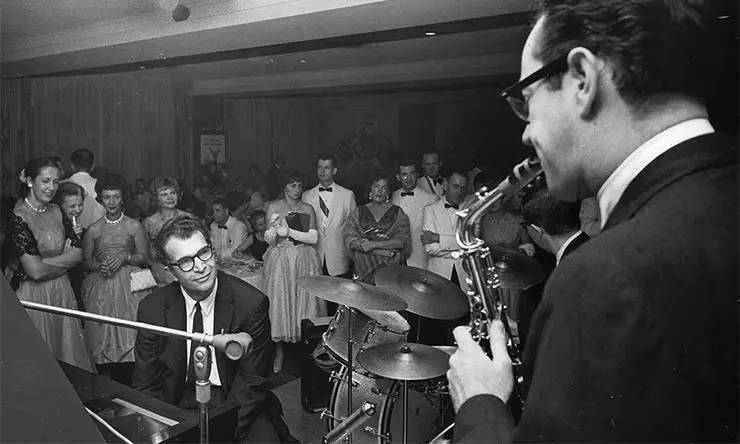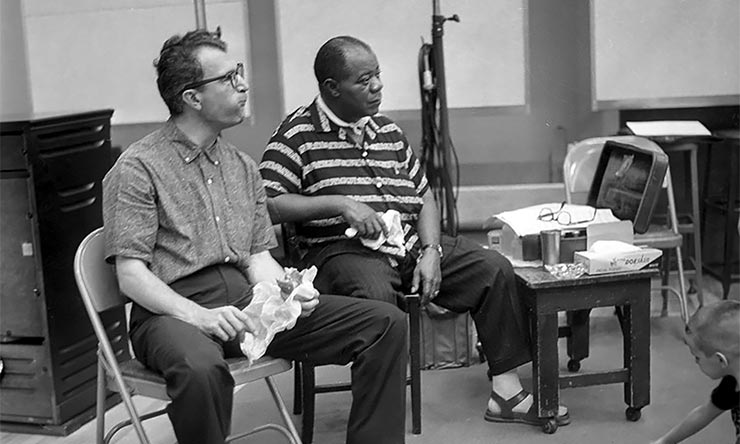Pianist David Warren Brubeck was born on 6 December 1920, in Concord, northeast of Oakland, and his centenary year is being recognised with an excellent, impressively detailed biography by Philip Clark (Dave Brubeck: A Life In Time, Da Capo Press), which explores the life and work of the musician, who died in 2012.
Clark spent time on the road with Brubeck and his wife, Iola, in 2003 and the biography contains fascinating new material about a man who pushed the boundaries of jazz for six decades, influencing scores of popular music stars, including Ray Davies of The Kinks, Ray Manzarak of The Doors and Deep Purple’s Jon Lord.
Sharp as a tack
Brubeck’s life criss-crossed with countless talented contemporaries and A Life In Time contains a wealth of information about his touring partner Miles Davis (who recorded Brubeck’s song ‘In Your Own Sweet Way’ back in 1957), along with Cecil Taylor, Chet Baker, Shelly Manne, Art Blakey, Lee Konitz, Charlie Parker, Cal Tjader, Lennie Tristano, Jimmy Giuffre, Max Roach and Gerry Mulligan, with whom Brubeck recorded an entire album.
The magnificent ‘Time Out’ and ‘Blue Rondo À La Turk’, both recorded in 1959, brought the Dave Brubeck Quartet international stardom – and they remain two jazz tunes that can be instantly recognised by members of the general public rather than diehard fans.
There are interesting offbeat reminiscences in the biography. Brubeck tells the author that the controversial comedian Lenny Bruce used to babysit his son Darius (who also became a jazz musician) after the musician and comic appeared on the same bill at the Crescendo club in Hollywood. “Lenny and I became good friends,” said Brubeck. “I didn’t expect Lenny and Darius to get close, but they kind of gravitated toward each other and we thought, Well, OK, it’s fine with us if someone wants to take the kids off our hands for the afternoon. And Lenny took it very seriously and was completely responsible, I have to say.”

Live at the Wisconsin Club, Milwaukee, 1961. Photo: John Bolger Collection
Compared to the drug-taking excesses of some of his fellow jazz men, Brubeck seemed deeply conventional, but he was as sharp as a tack. He is quoted warning about gangsters who “worm their way past your defences”, adding that “Charlie Parker’s a sad example of what could happen” when people exploit the addictions of musicians.
Defiant in the face of racism
There are tales of Brubeck’s groundbreaking tours in the late 50s – he went to Poland and caught dysentery in Baghdad – and a moving account of his defiant attitude towards racism during an era of segregation. In 1960 he cancelled a promotional appearance on NBC’s hugely popular Bell Telephone Hour Show because the producers insisted that black bass player Eugene Wright would have to be out of shot.
In 1964, Brubeck also openly defied the Ku Klux Klan at a gig held at the systematically racist University Of Alabama. Brubeck insisted that the band and audience be integrated – and he defied threats of violence and disruption from the KKK to play the concert to a mixed audience. The stand forced the university to allow integrated concerts from then on.
Two giants of jazz – Duke Ellington and Louis Armstrong – come out well in the book. Brubeck admired Armstrong and wrote a musical for him called The Real Ambassadors. Brubeck could not get word direct to the famous trumpeter so waited outside his Chicago hotel room to ask him to take part in a production of the show. “Eventually a waiter turned up with a tray of food, and when Louis opened and saw me there, he gave me a big smile and told the waiter that Mr Brubeck would be having the same as him – so one more steak, please,” the pianist recalled.

With Louis Armstrong in 1961. Photo: John Bolger Collection
Armstrong happily agreed to the project, a matter of lasting pride to Brubeck, who had grown up admiring the trumpeter as well as pianists such as Fats Waller and Teddy Wilson, who were Satchmo’s contemporaries.
A move into composing
Though Brubeck is associated with Colombia Records, A Life In Time tells the fascinating story of his move to Decca Records – and why he chose to move to that famous label in 1968 to record his extended choral and orchestral albums The Light In The Wilderness and The Gates Of Justice. “Now that Brubeck was interested in pursuing a career as a composer, he felt that Columbia had let him down,” writes Clark.
Some of the music Decca recorded was composed by Brubeck in tribute to his nephew Philip, who had died from a brain tumour at 16. Columbia executive Teo Macero was upset to lose one of their top jazz stars, but he admitted in a company memo in October 1968 that Decca were “doing more” for Brubeck as a label – and talked wistfully about the merits of Blue Note and Verve in the jazz field.
Brubeck went on composing, recording and performing for the next four decades before dying on 5 December 2012, a day before his 92nd birthday, on the way to a cardiology appointment. He left a magnificent jazz legacy that is well served by Clark’s impressive book.
Dave Brubeck: A Life In Time, by Philip Clark, is published on 18 February 2020 by Da Capo Press in the US and Headline in the UK. Buy it here.
